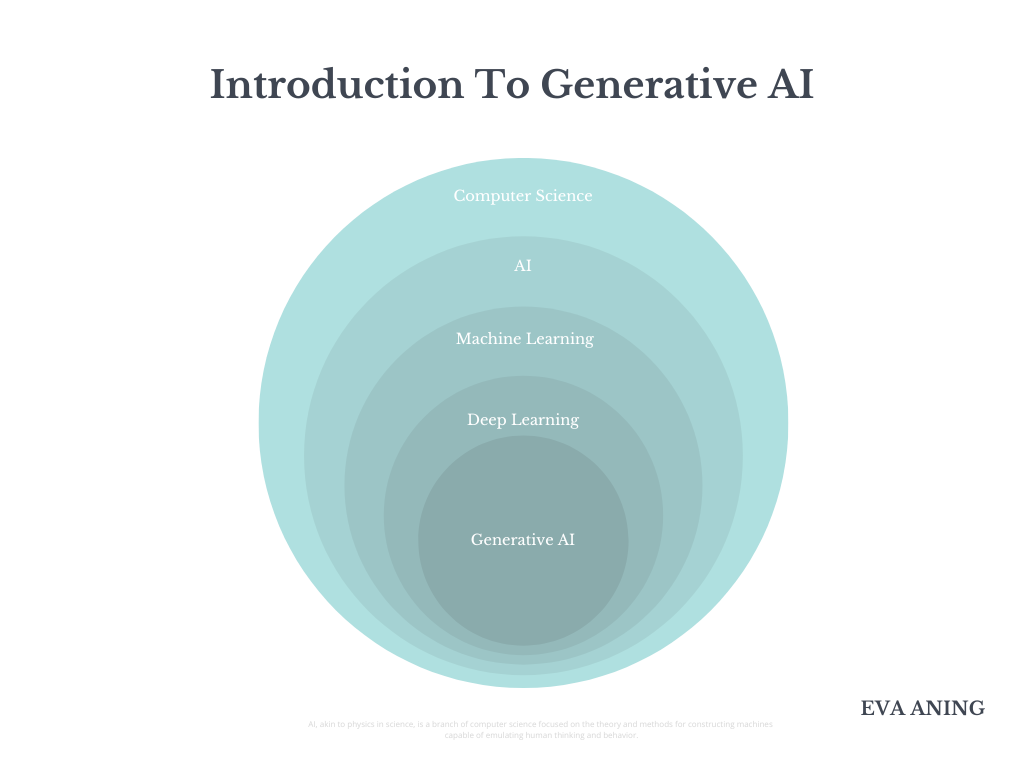
Hello leaders of tomorrow,
Artificial Intelligence has lately been a pioneering force in the pharmaceutical industry. Amidst its continuous evolution, the key to success lies in crafting a refined generative AI strategy capable of addressing unique challenges.
When used effectively, generative AI has the potential to streamline clinical trials, uncover overlooked issues, optimize marketing to reduce costs and save lives.
For leaders and business owners, the effectiveness and scalability of generative AI rely on understanding the underlying principles guiding these machines.
In today's letter, we will explore the following essential questions: What is AI? What determines Generative AI? How can we develop a skilled generative AI model?
What is AI?
Artificial intelligence (AI) serves as the starting point for Generative AI.
AI involves creating machines that mimic human thinking and behavior using methods and systems. Do you know how you learn new things over time? Well, AI is like that for computers.
The ultimate goal is to make computers smart enough to perform specific tasks independently, similar to those robots you see in movies.
As we explore AI further, we notice various types, such as machine learning, deep learning, and generative AI. They all work together to help computers learn from data and build new things humans might not have considered. They're teaming up to create a new world of possibilities.
What is Generative AI?
Generative AI is a part of the larger group of deep learning that functions similarly to a brain. While deep learning uses layers of neurons to process data and make predictions, Generative AI uses existing data to create new content such as text, code, images, audio, and more.
To get the best out of Generative AI, you must ask the right questions and study the results.
It's like you're the coach, and Generative AI is the player – you need to guide it to do its best work.
So, when using Generative AI, think about what you want to achieve. Ask questions like, "What problem am I trying to solve?" or "How can this help my business?" It's all about working together to make something awesome.
Developing a Generative AI model:
In AI, models learn from data that can help them learn from the past, predict something new, or discover new things. Providing different types of data allows the computer to learn without explicit programming. They don't need someone to tell them precisely what to do – they learn from the data themselves.
Generative AI, like other AI models, undergoes extensive training to refine its capabilities. It's like teaching a robot to write stories or draw pictures. It needs to see many examples and practice a ton to get good at it.
During training, the process resembles a math problem y = f(x).
The x part is like the question you ask; the y part is the answer it gives you. So, you give it a question (x), and it uses its smarts to come up with an answer (y).
Knowing how to talk to Generative AI, like ChatGPT, can help you get the best results. You can ask it all sorts of questions, like writing product descriptions or even creating new medicines.
Generative AI provides an initial answer, but it's just the beginning.
Delving deeper or adding more information is essential to get the best results. It's similar to conducting a science project - you continue experimenting until you find the perfect solution.
The training code and data you use here create a model to predict, classify, or cluster information. When we receive an output from our inputs, the generated content forms the basis of the model. However, it's crucial to go beyond this content to improve your search or add another layer to your research.
One result doesn't conclude our search, mainly if you aim to develop personalized medicine, optimize the supply chain, improve clinical trials, or incorporate functionalities in your business to assist in making better decisions or modifying your content to attract your target audience.
In Closing
Think of AI as your teammate in a big project. It's like having a magical sprinkle on your cupcake – it makes everything a bit better. Sure, it can give us a little boost, like making us 1% better at what we do. But the real magic happens when we work with AI and use our creativity.
We're the ones who understand the problem and dive deep into the data, just like a spider weaving its web. To make AI work its best, we must dig into the details and figure out exactly what we need. With a good plan and understanding of AI's work, we can make intelligent decisions that lead us in the right direction.
AI is like a Swiss Army knife – it's not just one tool, but many. It helps us discover new medicines, from the first idea to the final product. So, let's get to work, explore all the possibilities, and see how AI's special magic can make a difference.
Share in the comments which point you connected with the most and why.
Thanks for taking the time to read! If you liked this content, please consider becoming a free subscriber to express your support for my work or simply click the ❤️ button :)




"But the real magic happens when we work with AI and use our creativity."
I resonate with this statement, a couple years ago , I managed to self study and complete 2 Microsoft certification for data science and ai engineer.
You get to explore Azure machine learning techniques to train, evaluate, and deploy models that solve business problems.
Human oversight and creativity are crucial for achieving optimal results, as the models do need a lot of data to be refined over time. Thanks for sharing Eva.